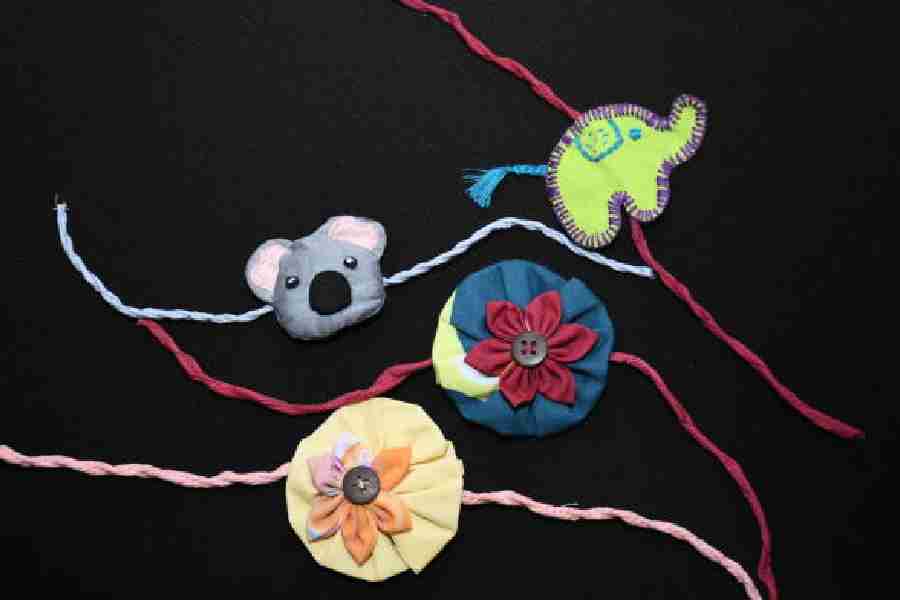In Bengal, the festival of Rakshabandhan traces its roots to communal harmony and universal brotherhood.
On Sunday, in the run-up to this year’s festival, a group of Calcuttans revisited those origins while touring a minority-dominated pocket of central Calcutta.
Over 40 people were part of the group that visited Colootola Street and Zakaria Street in Chitpore. The group was made of students, teachers and other professionals, researchers and volunteers who campaign for social amity and justice.
They tied rakhis on each others’ hands and those of everyone around. They walked up to the imposing Nakhoda mosque and tied rakhis on the hands of people stepping out of it. Some of the people were taken aback, albeit for a moment. Soon, the surprise turned into a smile.
The campaign recreated another over a century ago, one that had whipped up an unprecedented frenzy in Calcutta.
In 1905, Rabindranath Tagore had distributed rakhis among Muslims and Hindus to protest the Partition of Bengal. A lively account of the frenzy on that day, October 16, can be found in Gharoa (homely), a memoir-style book by Abanindranath Tagore, the poet’s nephew.
Abanindranath wrote about a “grand procession that surged ahead singing Banglar maati Banglar jal (the soil of Bengal, the water of Bengal), composed for the occasion”.
“The ghats (of the Hooghly) were bustling with people, with everyone trying to catch a glimpse of Rabikaka (Tagore),” he wrote.
Following a dip in the Hooghly, people started tying rakhis on the wrists of one another. While moving along Pathuriaghata, Tagore did something unexpected.
“As we came across some grooms tending to horses in a stable, Rabikaka and his followers surged at them and tied rakhis on their wrists. I sensed trouble. They were Muslims. A fight was inevitable,” he wrote.
But Tagore embraced the grooms who were also stunned. Tagore would then proceed to Nakhoda Masjid where rakhis were tied on the wrists of the maulvis as well.
The organisers of Sunday’s event said in a note: “In Bengal, Rakhi goes beyond the confines of a religious festival or a pledge of protection. It is a celebration of universal love and brotherhood. Tagore himself had started Rakhi bandhan in the backdrop of the Partition of Bengal. Today, when intolerance and division have reared their ugly heads in the minds of people in India and Bengal, Tagore’s Rakhi bandhan becomes all the more contextual.”
The programme was organised by Know Your Neighbour, a campaign that uses increased interactions between communities to promote harmony, and Azad Foundation, which provides livelihoods with dignity for resource-poor women in urban areas.
“When we see a teacher ordering children to slap their Muslim classmate, we know how important it is to organise such programmes,” said Sabir Ahamed, convener of Know Your Neighbour.
The walk was followed by a discussion at the ancestral house of one of the patrons Nakhoda masjid.
Prasun Chatterjee, director of Dostojee, the short but impactful 2021 film, was a participant in Sunday’s programme. The film tells a heart-warming tale of friendship between two boys — a Hindu and a Muslim — in a border village in the backdrop of the demolition of the Babri mosque and the Mumbai (then Bombay) blasts that followed.
“During the Partition of Bengal, Tagore had realised that to unify a community as diverse as India, you need a tool, a festival that is beyond the confines of religion.... A festival that entails a physical connection. To tie a rakhi, you have to touch the other person. It does not matter whether that person is Hindu, Muslim, Christian, Jain or Buddhist. Tagore was a philosopher to have started such a festival. It was topical and much needed more than a century ago. It is topical and much needed in today’s India,” Chatterjee said.
Madhuri Katti, a teacher and member of Know Your Neighbour, shared an anecdote from her classroom. “A student said she hated someone to express her dislike for that person. I told her to think before using a strong word like ‘hate’. I told her that our language need not be so aggressive,” said Katti.
